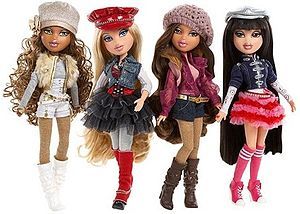Play
Throwing Out the Bratz
Toss or donate the toys that send a bad message, even if from Grandma
Posted January 14, 2013
The holiday season is finally, mercifully, over. As a family that celebrates Christmas, and a family with a large extended family, our two daughters bring home quite the haul. We literally spend days consolidating all of their presents into one room. This weekend we finally put them away, into their designated toy boxes, bins, and shelves. I always use this time of year to sort through what toys we have and toss the ones that are broken and donate the ones that have broken me.
I often feel guilty about disposing of toys that work well but just bug me. Tonight, I put the annoying Minnie Mouse book in the donate pile. Even though this was a recent Christmas present, Minnie’s cloying concern about bows and sparkle sent me over the edge after reading it three nights in a row. I don’t want my very smart 3 year-old thinking that looking cute should be her primary goal in life. We also just disposed of the Barbie Dream House that I overlooked in a moment of weakness last year.
The mom in me who hates waste, and wants to be polite, feels bad about this purge. But I have to remind myself that this is what parenting is. Censor-in-Chief. It is my job to control what my children are exposed to. This is what parents do. I don’t let my kids watch movies with cuss words or nudity, I don’t let them drink soda, and I don’t let them ride their bikes in the street. Why should I have less control over what toys I let my kids play with?

This means that I donate or toss any toys that I hate. For example, Barbies, Bratz dolls, and Monster High dolls never make it home. My oldest daughter got a Monster Hall doll this year. I politely thanked the gift-giver and discreetly got rid of the toy later. Her thigh-high boots and micro-mini were too much for me. This is my subterfuge, which usually happens without my kids ever noticing. I always feel a pang of guilt when I do this. But the reality is just because someone gave it to us, doesn’t mean I have to keep it. I don’t display the hunter green plaid hand towels from grandma. I don’t wear the awful applique sweater from my aunt. Why should I be different when it comes to my kids?
Besides some embarrassment, my tacky sweater doesn’t actually do me any harm. But studies show that children who play with Barbies have more negative attitudes about their own bodies than children who were given more normal looking dolls to play with. Girls who look at dolls wearing sexualized clothing (like Bratz dolls) think those types of clothes are the way for girls to be popular. I ban soda because it is bad for their health. These toys are just as bad. I don’t want them to have cavities; I also don’t want them to sexually objectify themselves or be ashamed of their bodies. Studies show seeing sexualized images, like Bratz dolls, leads to both. And as a developmental psychologist, I know that these aren’t just toys.
Toys are how kids learn about the world and their place in it. A toy doesn’t have to be labeled as educational to be instructive. Just because you aren’t aware of what your kids are learning doesn’t mean they aren’t learning.
So, I swallow my guilt about waste, and toss the toys. Goodwill loves to see me coming. It is how I reclaim my parenting power in world where my own moral voice is not always the loudest one my kids hear.


